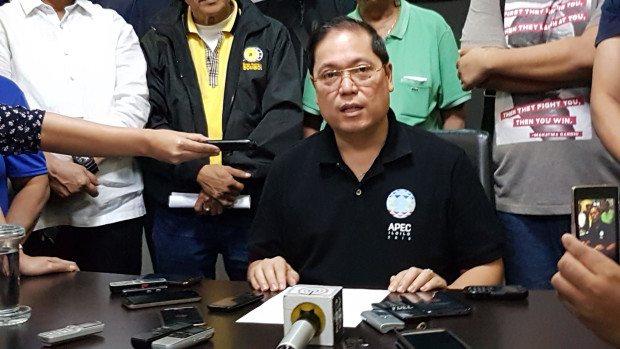Mayor: Iloilo City no longer ‘most shabulized’ as Duterte called it

Iloilo City Mayor Jed Patrick Mabilog holds press conference Sunday morning, Aug. 7, 2017, denying President Rodrigo Duterte’s allegation that he was involved in illegal drugs. (Photo by NESTOR P. BURGOS JR./ Inquirer Visayas)
ILOILO CITY — Iloilo City Mayor Jed Patrick Mabilog hopes President Rodrigo Duterte would be objective in appraising his city, which the chief executive once called “the most shabulized” in the the country – meaning it had a lot of shabu, or crystal meth, available.
Since then, Mabilog says his administration has been aggressive in the campaign against illegal drugs.
“I just hope the President takes an objective look at what has transpired,” the mayor said in a statement sent to the Inquirer. “It’s been one year, just short of five days, since he labeled our city ‘most shabulized.’ Iloilo City is a far different city now. I will work harder than ever to totally erase any remnants of the illegal drugs trade in our city. I won’t allow our city to remain in such low esteem in the eyes of the President.”
Mabilog admitted to reporters, however, that he was worried when he learned of the killing of Ozamiz Mayor Reynaldo Parojinog Sr., who was also identified by Duterte as a narco-politician.
“But we are confident that what we have been doing here is known to national leaders and that these have also reached the President,” he said.
Article continues after this advertisementPolice officers serving a search warrant gunned down Parojinog, his wife, and 13 others in simultaneous predawn raids on Sunday. They officers claimed the camp of Parojinog fired at them.
Article continues after this advertisementParojinog was the third mayor gunned down in a year after they were named among government officials involved in illegal drugs.
In October 2016, Datu Saudi Ampatuan Mayor Samsudin Dimaukom and nine others were killed in police anti-drug operations in North Cotabato.
More than a week later, Mayor Rolando Espinosa of Albuera, Leyte was killed by a police officer in an alleged shootout in his cell at the Leyte Sub-Provincial Jail in Baybay City.
“Am I worried? Of course I am,” Mabilog said. “But I don’t fear because I have a clear conscience and this will not paralyze me into inaction and fear. I need to muster all the courage to effectively bring our city out of this unfair branding and restore its good name before the eyes of the President and the Filipino people.”
The President named Mabilog on August 7 last year as among the officials, judges, and police officers involved in illegal drugs.
Duterte mentioned the Mabilogs’s name in at least three other speeches, referring to the mayor as a “cousin” of slain alleged Western Visayas drug lord Melvin Odicta.
Mabilog repeatedly denied having any link to illegal drug trading. He also lamented that the President apparently got his information wrong on his being a relative of Odicta.
Odicta allegedly headed one of the two main illegal drug groups in Western Visayas. A lone gunman shot him and his wife Merriam dead on Aug. 29, 2016 as the couple disembarked from a passenger ship at the Caticlan port in Malay town Aklan.
After being publicly accused of involvement in illegal drugs, no case has been filed against Mabilog almost a year after the President’s announcement.
Mabilog stressed that there had been no let up in the campaign against illegal drugs in the city even after he was stripped of operational supervision and control over the Iloilo City Police Office a year ago.
“I have mounted an intensified campaign to curb if not totally eliminate the problem of illegal drugs,” the mayor said. “We have invested heavily in education and rehabilitation, knowing fully well this battle can’t just be fought with guns and bullets.”
He said the city government also allotted “huge resources” to improve the capability of the police the anti-drug campaign.
On Monday, Mabilog led the commencement program for 199 drug users who had completed a 90-day rehabilitation program.
The first batch of 209 drug users completed the program in January.
The program initiated last year by the city government is being implemented rehabilitation centers in each of the seven territorial districts for drug users with light to moderate levels of addiction.
Those who finished the program also underwent skills and livelihood training. These include sessions on defensive driving, training in basic carpentry and in basic computer programming. /atm